Bitcoin
Utah Pushes Digital Asset Reserve Bill to Senate Approval


The Utah House of Representatives has passed HB 230, also known as the Blockchain and Digital Innovation Amendments. This marks a significant step in the state’s approach to digital asset investment.
The bill allows the state of Utah to allocate up to 5% of public funds to qualifying digital assets. It passed with a narrow 38-34 vote, with three abstentions.
Utah Takes a Bold Step Toward Digital Asset Investment
State Representative Jordan Teuscher presented HB 230 on January 21. The bill quickly passed the House Economic Development and Workforce Services Committee with an 8-1-1 vote before gaining approval in the House. It now moves to the Senate for further consideration.
“The ‘Strategic Bitcoin Reserve’ bill has officially PASSED the House in the state of Utah,” CEO of Satoshi Action Fund Dennis Porter shared on X (formerly Twitter).
Porter had previously predicted Utah’s potential to establish the first Bitcoin (BTC) reserve. He cited the state’s short 45-day legislative calendar and the role of its digital asset task force in pushing related initiatives forward.
Besides Utah, Arizona is the only other state with a similar bill nearing approval. The Strategic Bitcoin Reserve Act (SB1025) has passed the Senate Finance Committee and is now awaiting a vote in the House.
Despite the enthusiasm, some skeptics argue that HB 230 does not explicitly favor Bitcoin. X user Justin Bechler criticized the bill’s language.
“Utah H.B. 230 is not a ‘Strategic Bitcoin Reserve.’ It doesn’t reference Bitcoin once,” Bechler posted.
Bechler argued that the bill is structured to favor stablecoins. He pointed out that it includes any digital asset with a market capitalization exceeding $500 billion.
While this threshold seemingly includes Bitcoin, the legislation separately categorizes stablecoins as qualifying assets. He further noted that the bill mandates asset custody through banks, trust companies, or exchange-traded products. This aligns with centralized stablecoin management rather than Bitcoin’s decentralized ethos.
“Bitcoin is just the bait, stablecoins are the real target,” the post read.
Additionally, Bechler highlighted a money transmitter exemption within the bill. While it facilitates digital asset exchanges, it does not aid Bitcoin adoption in Utah, according to him.
“Not only is this legislation not a “Strategic Bitcoin Reserve” but, in fact, it specificially prohibits the state from owning Bitcoin,” he further explained.
Nonetheless, Porter pushed back against the criticism.
“Only bitcoin qualifies,” he asserted.
Porter clarified that the bill was purposely structured to maximize its likelihood of passing into law. He explained that the bill exempts individuals from needing a money transmitter license when running a node or operating a blockchain protocol, such as Bitcoin.
He encouraged Bitcoin supporters to examine the bill carefully. Furthermore, he firmly rejected the notion that the legislation would restrict Bitcoin ownership.
The bill’s next hurdle is the Senate. Further debates will determine whether Utah’s digital asset strategy will favor Bitcoin or lean toward stablecoins.
Disclaimer
In adherence to the Trust Project guidelines, BeInCrypto is committed to unbiased, transparent reporting. This news article aims to provide accurate, timely information. However, readers are advised to verify facts independently and consult with a professional before making any decisions based on this content. Please note that our Terms and Conditions, Privacy Policy, and Disclaimers have been updated.
Bitcoin
Is Bitcoin Ready for Another Surge?
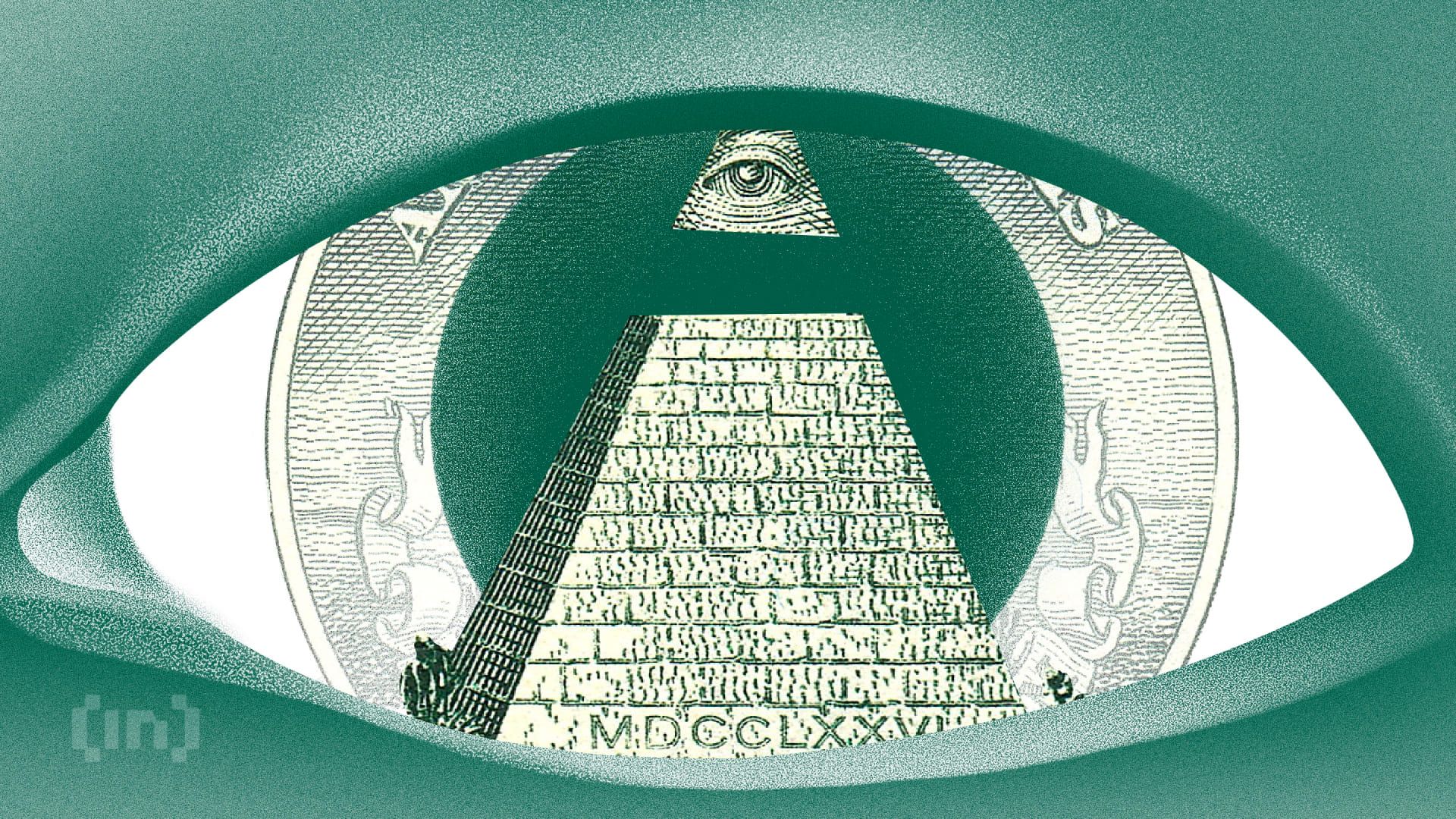
The US Dollar Index (DXY), which measures the dollar’s value against a basket of foreign currencies, has dropped to a three-year low. The decline contrasts with gold’s performance, which hit an all-time high of $3,220 amid rising trade war tensions.
Yet, DXY’s dip has sparked optimism among cryptocurrency investors. Many see the weakening dollar as a bullish signal for Bitcoin (BTC), which has recently shown signs of modest recovery.
Will Bitcoin Rally Following the DXY Index’s Fall?
Data shows that the DXY index dropped by 1.5% in the last 24 hours. As of press time, it stood at 99.4, marking its lowest level since April 2022. The decline is part of a broader trend in 2025, with the DXY down 8.3% since January.
“The US dollar index dropped to its lowest level in nearly three years amid capital outflows from American assets. Escalating trade tensions and growing concerns over broader economic fallout, particularly for the US, have weighed heavily on market sentiment,” CryptoQuant’s Alex Adler told BeInCrypto.
Notably, the index’s fall below 100 marks a critical threshold. Historical data highlights a strong correlation between a declining DXY and substantial Bitcoin price surges.
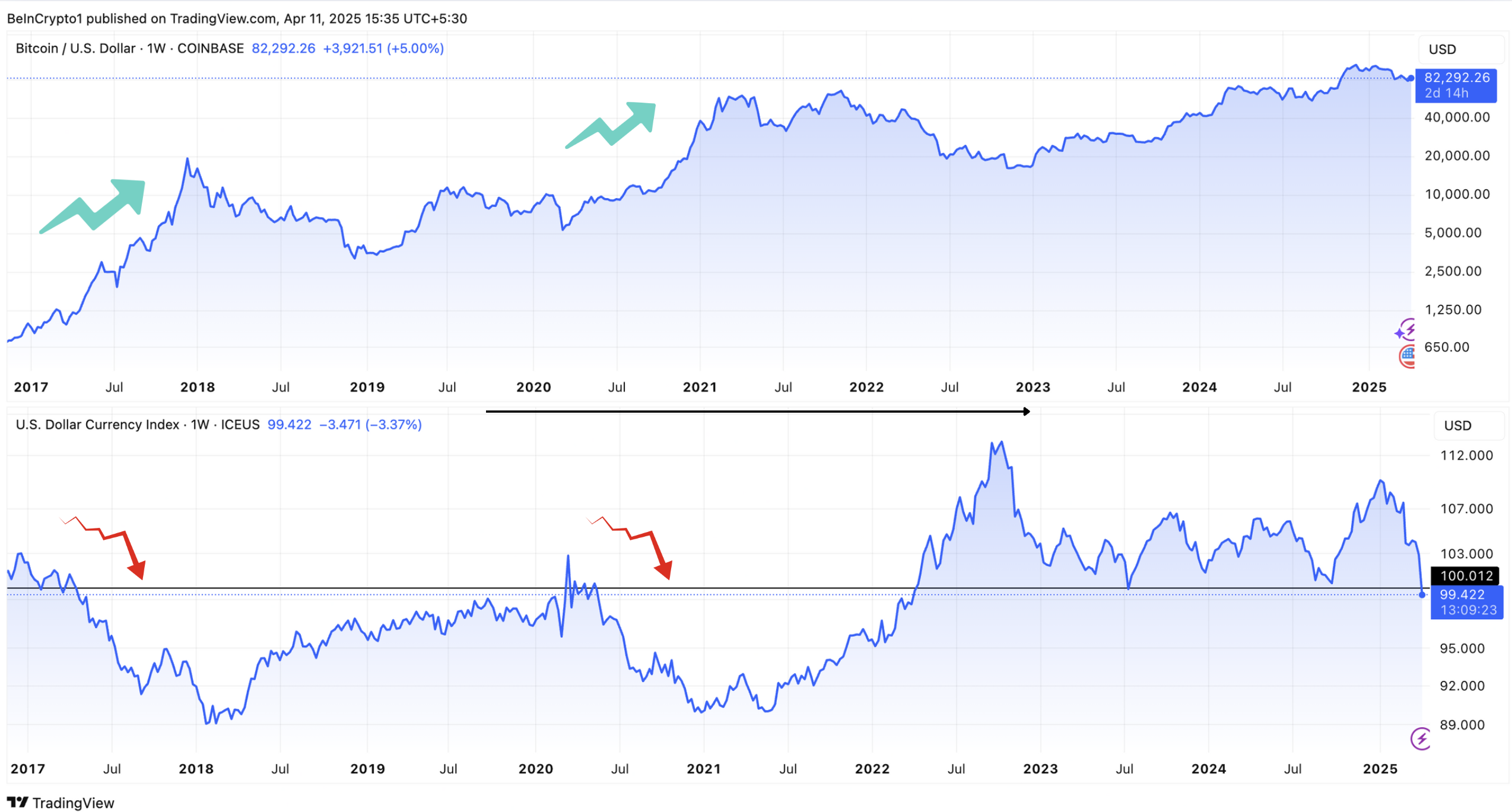
The last two times the DXY fell below the 100 mark—in April 2017 and May 2020—Bitcoin experienced significant, months-long rallies. These substantial increases have led to speculation that history could repeat itself. If it does, Bitcoin could potentially be poised for another major surge.
Interestingly, Bitcoin has already shown signs of recovery after the 90-day tariff pause. The largest cryptocurrency reclaimed the $80,000 level, signaling renewed investor confidence. According to BeInCrypto data, Bitcoin appreciated by 0.8% over the past 24 hours. This reflected minor but positive gains that suggest momentum could be building.
In fact, the market watchers on X (formerly Twitter) share a similar outlook.
“Weak dollar is going to be a surprising tailwind for emerging markets this year that wasn’t on anyone’s bingo card,” a user wrote.
Meanwhile, an analyst observed that the US dollar’s decline has occurred despite the Federal Reserve’s failure to reduce interest rates or implement quantitative easing (QE).
“Traditionally, DXY going down is very bullish for BTC,” he said.
The analyst also highlighted a notable bearish divergence on the charts. Thus, he predicted that the dollar could potentially drop to 90, signaling a further decline in its value.
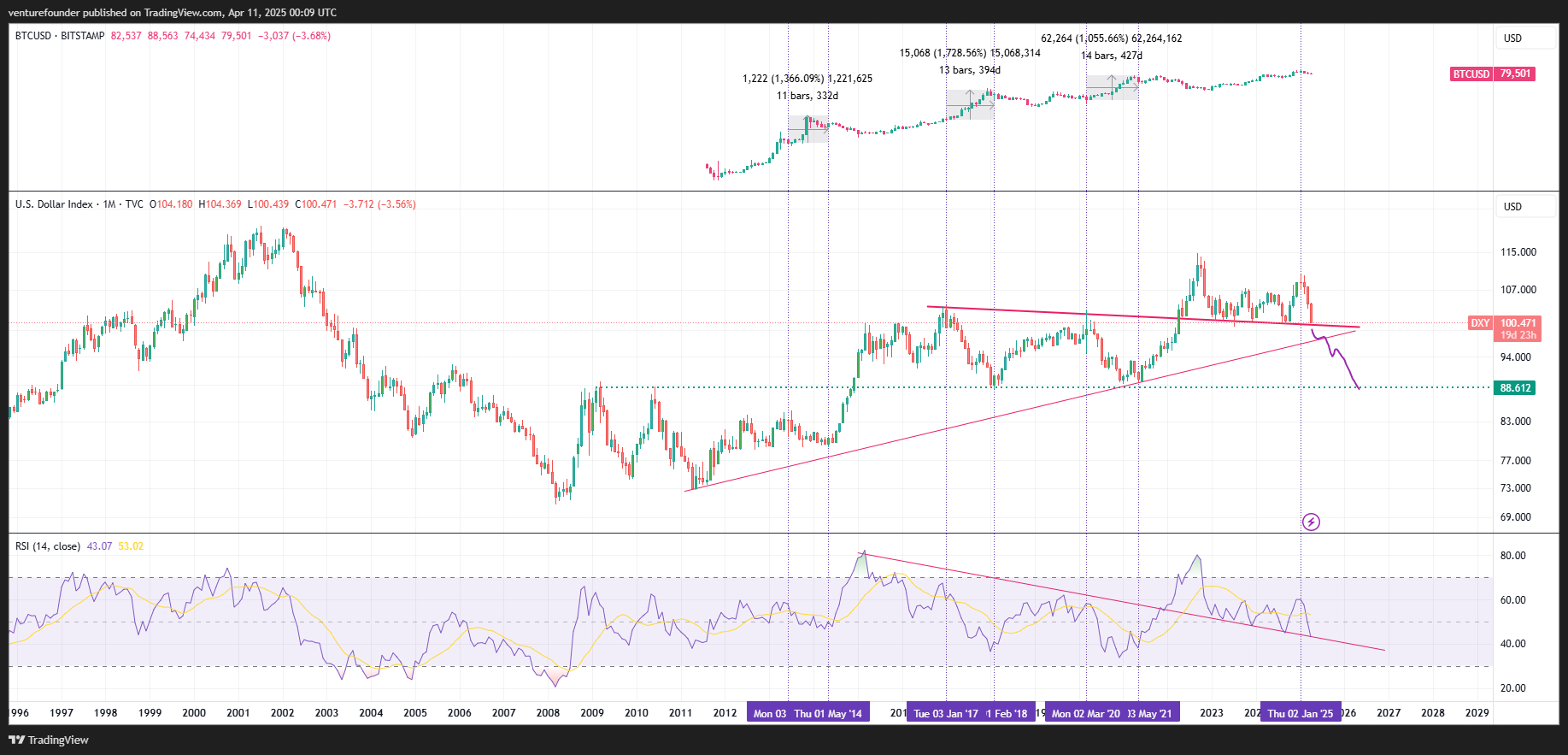
Similarly, another analyst described DXY’s decline as “one of the best anticipated macro moves ahead.”
“Each time this has happened in the past, it resulted in a massive bull market for Bitcoin, Crypto, and stocks,” Jackis remarked.
He also acknowledged that the markets have been slow to react, attributing this delay to a lag of more than three months. Additionally, he noted that the ongoing bond situation between China and the US, driven by escalating trade tensions, is contributing to this slow reaction.
Yet, he believes this situation will either be resolved through a deal between the two countries or the Federal Reserve will intervene by buying long-term bonds to stabilize the market. Now, the coming weeks will be crucial to determine whether Bitcoin will actually enter another bull run or falter under geopolitical tensions and broader market shifts.
Disclaimer
In adherence to the Trust Project guidelines, BeInCrypto is committed to unbiased, transparent reporting. This news article aims to provide accurate, timely information. However, readers are advised to verify facts independently and consult with a professional before making any decisions based on this content. Please note that our Terms and Conditions, Privacy Policy, and Disclaimers have been updated.
Bitcoin
Over $2.5 Billion in Bitcoin and Ethereum Options Expire Today

Crypto markets will witness over $2.5 billion worth of Bitcoin (BTC) and Ethereum (ETH) options expire today.
Traders are particularly attentive to this event because it has the potential to influence short-term trends through the volume of contracts due for expiry and their notional value. Examining the put-to-call ratios and maximum pain points can provide insights into traders’ expectations and possible market directions.
Bitcoin and Ethereum Options Expiring Today
The notional value of today’s expiring BTC options is $2.23 billion. According to Deribit’s data, these 27,657 expiring Bitcoin options have a put-to-call ratio of 0.86. This ratio suggests a prevalence of purchase options (calls) over sales options (puts).
The data also reveals that the maximum pain point for these expiring options is $81,000. In crypto options trading, the maximum pain point is the price at which most contracts expire worthless. Here, the asset will cause the greatest number of holders’ financial losses.
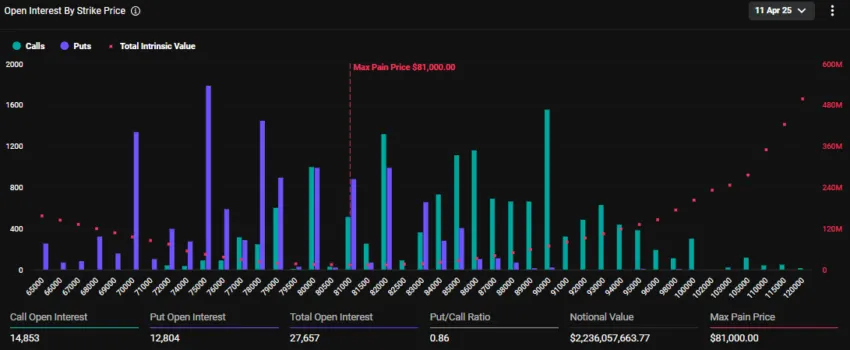
In addition to Bitcoin options, 183,468 Ethereum contracts are set to expire today. These expiring options have a notional value of $283.6 million and a put-to-call ratio of 0.92. The maximum pain point is $1,700.
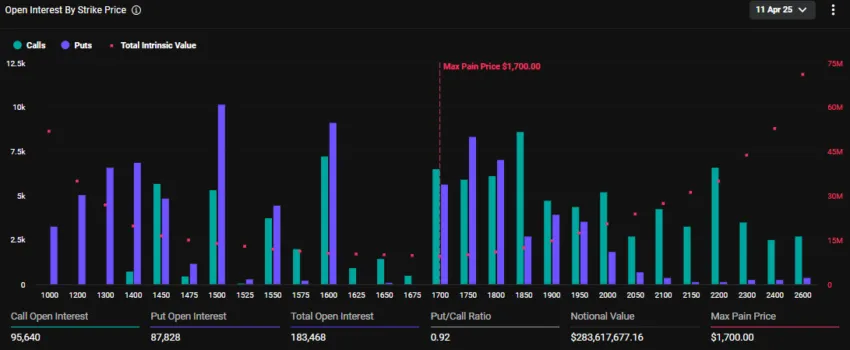
The current market prices for Bitcoin and Ethereum are below their respective maximum pain points. BTC is trading at $80,622, while ETH sits at $1,543.
“With recent market volatility and ongoing tariff developments, how do you think these expiries will impact price action?” Deribit posed.
Deribit is a crypto options and futures exchange. Indeed, crypto markets are reeling from massive volatility induced by the trade war chaos following President Trump’s tariffs. Meanwhile, Cardano founder Charles Hoskinson says future tariffs will be ineffective on crypto.
He thinks that tariffs are already priced and that future announcements will be a ‘dud’ for the crypto market.
Traders Brace for Extended Weakness as Call Premium Fades Until September
Elsewhere, analysts at Deribit note a shift in crypto options, with short-term dips still bringing put demand. Meanwhile, the call premium is further out of the curve and fades.
“You now have to look all the way to September before calls retake the skew. Traders might be bracing for extended weakness,” Deribit noted.
This suggests traders might be bracing for extended weakness in the crypto market. A fading call premium, where the implied volatility (IV) of calls drops relative to puts, suggests that traders are less optimistic about price increases in the near to medium term.
A negative or reverse volatility skew, where OTM puts ((out-of-the-money puts) have higher IV than OTM calls ((out-of-the-money calls), is common in equity markets when investors fear price drops.
This pattern appears to play out in the crypto options market, reflecting heightened concerns about downside risks. Analysts at Greeks.live note that BTC’s IV has declined significantly and is now largely holding nearly 50% across all maturities.
On the other hand, ETH’s IV has maintained a higher level, with short to medium-term volatility holding near 80%. Selling ETH options in the short term would be a good trade for traders.
Global economic uncertainty, including the US-China tariff war, has dampened risk appetite. Crypto’s inherent volatility could also be fueling this cautious outlook.
“Sentiment was more panicky this week, with Trump’s frequent switching of tariff policies making the market extremely risk averse,” analysts at Greeks.live wrote.
The Greeks.live analysts agree with Deribit’s expectations of extended weakness. However, unlike Hoskinson, they expect continued uncertainty and volatility in the market for a long time.
For traders, this suggests a need for hedging strategies, like buying puts or diversifying into stablecoins.
“Cryptocurrencies are currently suffering from a lack of new incoming money, a lack of new narratives, and a more subdued investor sentiment. In this worse market of bulls to bears, the probability of a black swan will be significantly higher, and buying some deep vanilla puts would be a good choice,” Greeks.live analysts concluded.
Disclaimer
In adherence to the Trust Project guidelines, BeInCrypto is committed to unbiased, transparent reporting. This news article aims to provide accurate, timely information. However, readers are advised to verify facts independently and consult with a professional before making any decisions based on this content. Please note that our Terms and Conditions, Privacy Policy, and Disclaimers have been updated.
Bitcoin
Bitcoin Holders are More Profitable Than Ethereum Since 2023

New data from Glassnode suggests that Bitcoin’s MVRV (Market Value to Realized Value) has been higher than Ethereum’s for 812 consecutive days. This means that the average BTC investor has accumulated much larger profits than their ETH counterpart since 2023.
Due to recent losses, Ethereum’s MVRV actually fell below 1.0, suggesting that the average investor has lost money. It may be undervalued and well-posed for a resurgence, but this will take time.
Bitcoin vs Ethereum: Which is More Profitable?
Despite a few recent market turmoils, the price of Bitcoin is doing reasonably well right now. Although much of its gains since Trump’s election have been wiped out, its pre-election value spent most of 2024 at a shelf near its previous all-time high.
According to new data from Glassnode, Bitcoin’s investor profitability is far above Ethereum’s.
“Since November 2022 (FTX collapse), Bitcoin’s realized cap has grown by $468 billion (+117%), while Ethereum’s increased by just $61 billion (+32%). Bitcoin investors have held consistently larger unrealized profits than #Ethereum holders since January 2023. BTC investor profitability has exceeded ETH for 812 consecutive days – an all-time record,” Glassnode said.
Glassnode came to these conclusions by analyzing both tokens’ MVRV and their ratio of market value to realized value. This metric compares the listed price of Bitcoin and Ethereum to the actual price at which these tokens were most recently traded.
Despite maintaining similar MVRVs for a prolonged period, Bitcoin is plowing well ahead today:

While Bitcoin has been more volatile than Ethereum, the altcoin has seen a much smaller uptick during bullish cycles. For instance, in the latest bull run between October and December 2024, Bitcoin surged by nearly 70%.
In the same period, Ethereum’s price increase was less than 50%. Yet, if we look at the drop during the current market downturn, BTC lost 3% in the first week of April, while ETH lost over 15%.
Meanwhile, the altcoin’s investor sentiment is also dropping. Major whales who HODL’ed the token for many years are now selling their ETH holdings.
Also, the average Bitcoin holder enjoys an MVRV of around 2.0, meaning that they have huge unrealized gains. Most of their counterparts have an MVRV below 1.0, signifying that they have lost money. These data points are concerning, especially for the median ETH holder.
However, there’s a silver lining. Ethereum recently fell to a yearly low, but there’s also a strong uptick of new investors. New developments, like the SEC approving ETH ETF options trading, could spur a recovery.
In other words, Ethereum may be highly undervalued and, therefore, an attractive investment.
Still, for the time being, Bitcoin holders are in a much better position than ETH holders. Ethereum is still the second-largest cryptoasset by market cap, and it can always make a comeback. This will almost certainly pose a significant challenge.
Disclaimer
In adherence to the Trust Project guidelines, BeInCrypto is committed to unbiased, transparent reporting. This news article aims to provide accurate, timely information. However, readers are advised to verify facts independently and consult with a professional before making any decisions based on this content. Please note that our Terms and Conditions, Privacy Policy, and Disclaimers have been updated.
-
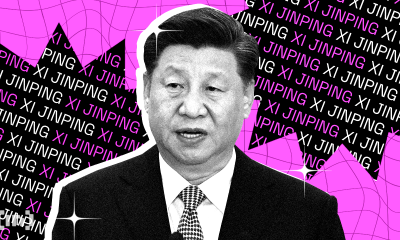
 Market24 hours ago
Market24 hours agoChina Raises Tariffs on US to 125%, Crypto Markets Steady
-
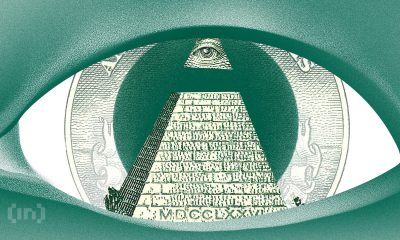
 Bitcoin24 hours ago
Bitcoin24 hours agoIs Bitcoin Ready for Another Surge?
-

 Market16 hours ago
Market16 hours agoThis is Why The Federal Reserve Might Not Cutting Interest Rates
-

 Market23 hours ago
Market23 hours agoBinance, Trade Wars, Ripple and SEC
-

 Regulation19 hours ago
Regulation19 hours agoUS Senators Reintroduce PROOF Act To Set Reserve Standards for Crypto Firms
-

 Market19 hours ago
Market19 hours ago3 Altcoins to Watch for Binance Listing This April
-

 Market22 hours ago
Market22 hours agoHow You Can Find Altcoin Winners Early
-

 Market21 hours ago
Market21 hours agoInvestors Shift to Crypto, Gold, and Equities Amid Tariff Volatility


















